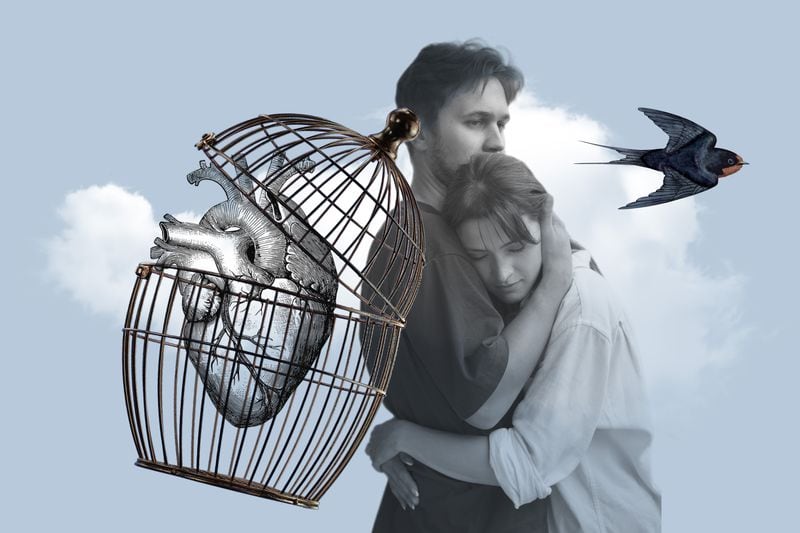In the book Swimmer in the secret sea, the American author William Kotzwinkle, known for his fantastic stories like the literary adaptation of the film ET, tackles a completely different subject. Yes OK secret sea swimmer It is also a fictional story, it almost seems like a testimony that tells the sequence of events that a father experiences just before the birth of his first child, when things don’t go as planned.
John, the protagonist of the story, tells in this short story how a father experiences the loss of an unborn child. And how, all of a sudden, he goes from being a future father to experiencing a lost fatherhood denied by his environment.
What is celebrated on the day of perinatal mourning
Although perinatal bereavement has been a recurring topic in recent decades, there is a gap that is generally not considered: that of parents. A study published in the journal JAMA Psychiatry reports that approximately 15% of women experience perinatal grief or depression after a spontaneous abortion, stillbirth, or neonatal death. This statistic reflects the significant emotional impact of perinatal loss on mothers and confirms the importance of providing them with support and resources to help them cope with grief and mental health issues after a loss. Even if it is a duel that is still little visible, secret sea swimmer William Kotzwinkle suggests that, in the case of a father, this loss is also experienced but little recognized. Because the bond that unites a father or mother to a child begins to be established even before birth and can be a source of both joy and deep pain.
Leslie Araya, a perinatal clinical psychologist specializing in grief and certified EMDR therapist, explains that Perinatal bereavement is the process that parents experience when they experience the loss of a child during gestation, pregnancy, childbirth or shortly after birth. The specialist explains that, according to her clinical experience, this grief usually manifests itself through denial, anger, sadness, among other emotions. “It’s an unexplainable pain, parents describe it as a roller coaster, one day they might feel like they’re up there, feeling a little better, getting air, but other times they feel like they’re falling into a void, sometimes they’re scared, other times they’re guilty, confused, sad, intense,” he says. “There’s no timetable, there’s no There is no prediction when it comes to grief.” And this is true both for women who experience the loss of a child and for parents.

Despite the increasing visibility of perinatal bereavement, Leslie emphasizes that it is mainly women who consult initially. However, he points out that every day, thanks to greater awareness and greater availability of support resources, parents have also dared to ask for help. “In addition to psychotherapy, today there are support groups exclusively for men and during collective events like ‘Remembrance Day’ there is also a space for them,” explains the psychologist. “However, dads are still stigmatized.”
A father’s grief differs from a mother’s in the way it manifests and is addressed. The specialist points out that parents can feel pressure to be strong and act in support of their partner, which sometimes makes it difficult to express and openly deal with their own pain. Social and cultural expectations also play an important role in a parent’s grieving process during a perinatal loss. “Many cultures tend to have rigid expectations for how men should manage their emotions,” says Leslie. “This can make it difficult for parents to express their grief openly. ” Furthermore, Gender expectations can make fathers feel like they need to be the “strong pillar” of the family, which can hinder their ability to seek emotional support. Bereaved parents report less perceived support from family and professionals, Leslie says. “People often ask ‘how is your wife?’, which also makes invisible the fact that the pain is familial and not just the mother’s.”
In this parental ecosystem, the specialist underlines the importance of seeking support from specialized professionals and of allowing yourself to feel and express your emotions. Additionally, it highlights the crucial role of support from partners, family and friends in helping parents cope with perinatal bereavement. A common misconception, according to the psychologist, is the idea that parents must quickly “get over” their grief to support their partner. “It is important to recognize that perinatal bereavement is a valid and unique experience for each individual, regardless of gender,” he emphasizes.
Estimated figures indicate that one in four pregnancies ends in loss while, each year, more than 5 million children are born stillborn or die within the first week. In a systemic review of available research published in 2020 in the journal BMC Pregnancy and Childbirth, it is explained that men show a more widespread tendency than mothers to engage in compensatory behaviors after a loss.
Men also demonstrate greater avoidance behaviors and have more difficulty accessing emotional support. However, the publication highlights that most research on perinatal bereavement focuses on women, mothers’ experiences and loss. Leslie Araya, a perinatal clinical psychologist specializing in grief and certified EMDR therapist, explains that: In the event of perinatal bereavement, it is crucial to emphasize mutual support between the members of the couple. “Both parents are experiencing deep pain and loss, and the path to healing can be especially difficult if it is not shared and addressed together,” she explains. According to the specialist, it is important to recognize that perinatal bereavement deeply affects both members of the couple and that support and mutual understanding are essential to overcome this devastating experience.
Source: Latercera
I am Robert Harris and I specialize in news media. My experience has been focused on sports journalism, particularly within the Rugby sector. I have written for various news websites in the past and currently work as an author for Athletistic, covering all things related to Rugby news.


